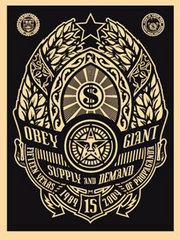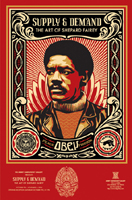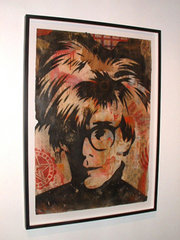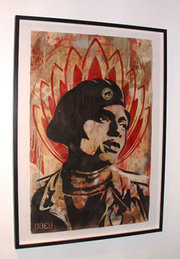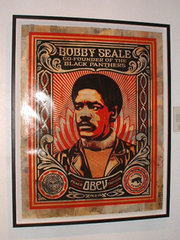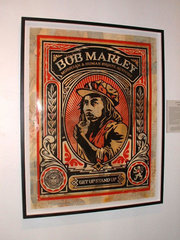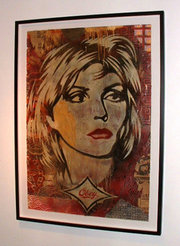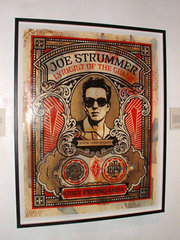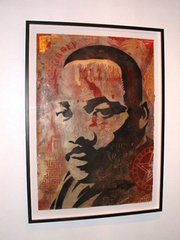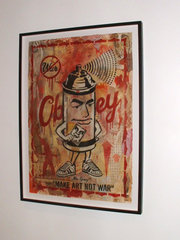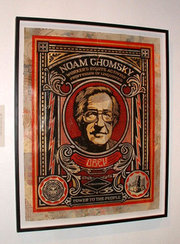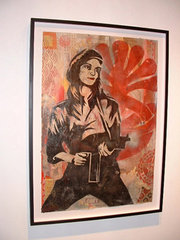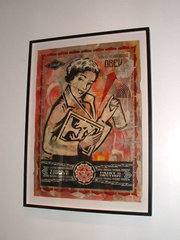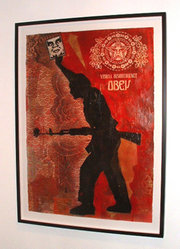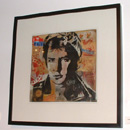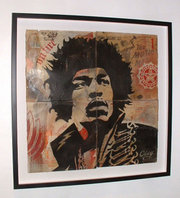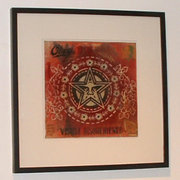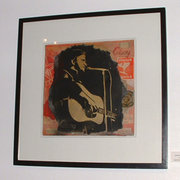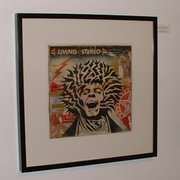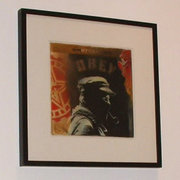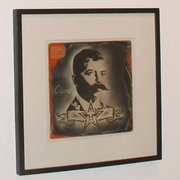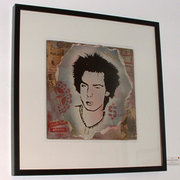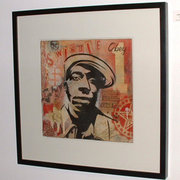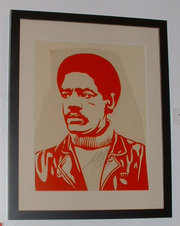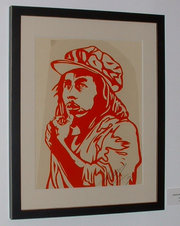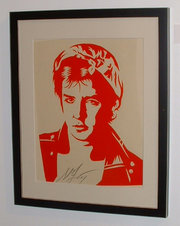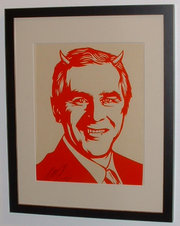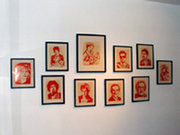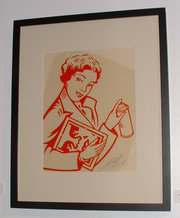Supply and Demand (Merry Karnowsky Gallery) (Difference between revisions)
From The Giant: The Definitive Obey Giant Site
Illyanadmc (Talk | contribs) m (edited for formatting, estimated gallery opening date based on article dae) |
m |
||
| Line 120: | Line 120: | ||
|} | |} | ||
| − | |||
{{copyright}} | {{copyright}} | ||
[[Category:TheGiant.Org]] | [[Category:TheGiant.Org]] | ||
[[Category:Events]] | [[Category:Events]] | ||
Latest revision as of 23:57, 11 November 2006
Shepard's Supply and Demand gallery show made an appearance at Merry Karnowsky Gallery in Los Angeles, California. It ran from October 9 until November 6, 2004.
Review article from USC Daily Trojan:
Artist obeys law of 'Supply and Demand'
Katherine Beck
Issue date: 10/13/04 Section: Lifestyle
Media Credit: Katherine Beck | Daily Trojan
It is hard to imagine Jimi Hendrix, Mao Zedong and Andy Warhol in a room together. However, the iconoclasts' portraits, among other unlikely figures, all appeared in graphic design artist Shepard Fairey's transitional collection "Supply and Demand."
An eclectic crowd mingled Saturday night at the Merry Karnowsky Gallery, clustering around the art at the "Supply and Demand" opening.
A gallery in general is an unusual setting for Fairey's work, as the renowned street artist has previously practiced "visual disobedience" in public settings.
The word "obey" appears in almost all of Fairey's innovative mixed media work and lends a look at the street artist's beginnings.
"The Obey Giant" project, known more simply as "Obey," has gained worldwide recognition after starting in 1989 as what Fairey describes as a "college goof-off."
Fairey, who attended the Rhode Island School of Design, made stickers featuring the mug shot of legendary wrestler Andre the Giant and put them up everywhere.
While the "Obey Giant" is an obscure choice for a poster child, it is its absurdity that makes it all the more intriguing.
Whether "Obey" incites a positive or a negative reaction is irrelevant to Fairey; he merely hopes to stir his viewers' awareness of their surroundings.
The word "obey" is used to trigger a questioning of obedience to the conventions of society.
Handing out free "Obey" stickers at the gallery opening, Fairey encouraged his audience to participate in spreading the word.
But "Obey" is more than a word. "Obey" is a defiant idea that has become an alternative way of thinking for Fairey.
After fifteen years "Obey" is a global phenomenon and Fairey's mark can be seen on small stickers to huge murals, from the streets of downtown Los Angeles to Amsterdam.
And now the street artist is showing his art in galleries. Is this the dreaded sell-out he has strived to avoid for so long?
Not quite.
Fairey noticed the demand for his work and felt the responsibility to supply his viewers with more, hence "Supply and Demand."
Fairey's ambition is to keep the art affordable to a mass audience. Forty dollars buys an original silk-screen poster, signed by Fairey himself, or one can pick up a few stickers for free.
Although Fairey commands high prices for his newer pieces, he continues to exhibit his work in the freedom of the street.
Richard Duardo, the famous Los Angeles printer, described Fairey's work as "heroic."
Fairey uses inventive mediums to display his mixed media art, ranging from vintage album covers to wood and even metal.
Fairey's unlikely heroes are emblazoned with crisp silk-screens and a spattering of spray paint.
The use of striking text is another trademark of Fairey's technique, and when juxtaposed with texture and color it is undeniably eye-catching.
Wartime propaganda posters as well as advertising, which Fairey views as a "modern-day type of propaganda," were strong influences on his style.
"If art utilizes really great aesthetics and humor, people take their guard down and then you actually have time to slip your message in without as much resistance," Fairey said.
Politically outspoken artist Robbie Conal, now an undergraduate drawing professor at USC, was an early inspiration to Fairey because he was "bypassing the galleries, taking it straight to the people."
Fairey also emulated the Sex Pistols' crude graphic design work as well as feminist Barbara Kruger's unexpected text choices.
Some of Fairey's subjects have a decidedly political slant.
"Right now, it's a crisis," said Fairey, in reference to America's current political situation. "I would feel guilty if I wasn't speaking my mind right now. The most powerful way to speak my mind is through my art."
Although Fairey's liberal views are expressed in his work, he has become increasingly popular and has a high-profile client list including Pepsi, Universal Pictures and Vans.
Fairey is the owner of a graphic design company, Studio Number One, in downtown Los Angeles, as well as a clothing line that bears the "Obey" brand.
Two books, Post No Bills (2002) and more recently Obey Giant (April 2004) document Fairey's work and ideas.
-
"Supply and Demand" will be on display through Nov. 6 at the Merry Karnowsky Gallery at 170 S. La Brea Ave. Admission is free.
Pictures from Shepard's 2004 gallery show Supply and Demand at the Merry Karnowsky Gallery:
© Copyright |
|---|
| This page contains an image or images of drawings, paintings, photographs, prints, or other two-dimensional works of art, for which the copyright is presumably owned by either the artist who produced the image, the person who commissioned the work, or the heirs thereof. It is believed that the use of low-resolution images of works of art for critical commentary on the work in question, the artistic genre or technique of the work of art, or the school to which the artist belongs on the English-language website thegiant.org, hosted on servers in the United States, qualifies as fair use under United States copyright law. |
